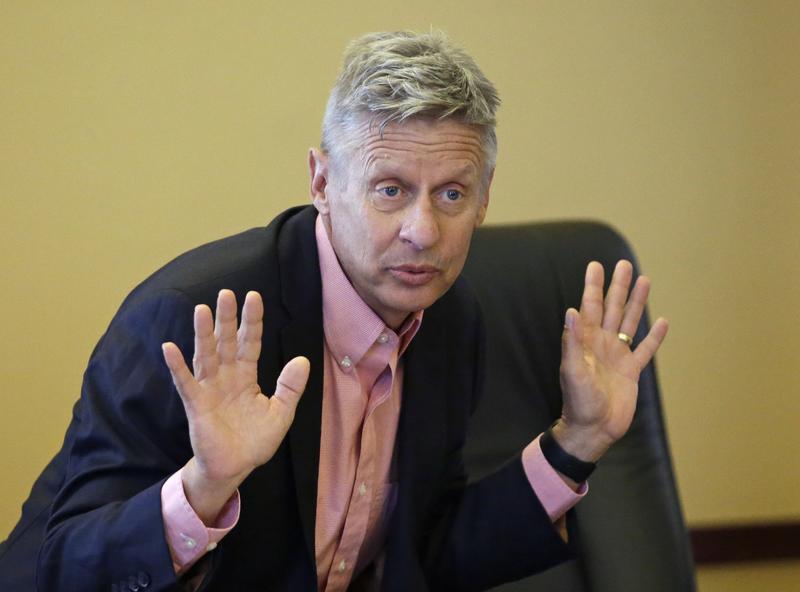BROOKE GLADSTONE: This is On the Media. I’m Brooke Gladstone.
BOB GARFIELD: And I’m Bob Garfield. Wednesday was a bad day for Libertarian presidential candidate Gary Johnson. When MSNBC's Chris Matthews asked him to name a foreign leader he respected, Johnson - came up blank.
[CLIP]:
CHRIS MATTHEWS: You got to do this, anywhere, any continent, Canada, Mexico, Europe, over there, Asia, South America, Africa, name a foreign leader that you respect.
GARY JOHNSON: I guess I’m having an Aleppo moment.
[END CLIP]
BOB GARFIELD: That’s a reference to his other bad day earlier this month. When he was asked what he would do, if elected, about Aleppo, Johnson said.
GARY JOHNSON: And what is Aleppo?
BOB GARFIELD: Subsequently, speaking with journalist Mark Halperin, Johnson reflected on his failings.
GARY JOHNSON: Believe me, I – no one is taking this more seriously than me. I – you know, I feel horrible.
MARK HALPERIN: What do you think will happen now?
GARY JOHNSON: Well, that I have to get smarter.
BOB GARFIELD: And maybe we, the electorate, need to get smarter about Gary Johnson, who’s currently polling at an average of 7% nationally. Cindy Simmons is a senior lecturer of journalism at Penn State but back in 1997, she was a reporter in New Mexico where Johnson was the governor, and she says there are some instructive stories about the Libertarian candidate that have not yet surfaced. Cindy, welcome to On the Media.
CINDY SIMMONS: Thanks so much.
BOB GARFIELD: You and the governor have some history.
CINDY SIMMONS: We do. I was a reporter for KUNM, covering the state legislature, and Gary Johnson had recently been elected as an outsider Republican, so someone who had never really held office but who was going to bring business sensibility to state government.
BOB GARFIELD: So one particular morning in February of 1997, you walk into the statehouse press room, and?
CINDY SIMMONS: There was pandemonium. Everyone had missed a major story. Gary Johnson's administration had given an exclusive to a TV station that there was a tunnel at the penitentiary of New Mexico and inmates were planning a major breakout.
BOB GARFIELD: Wow, that’s not a story that you want to have missed. Was it something that would have been in your portfolio?
CINDY SIMMONS: Of course, yes. Prisons are particularly important in New Mexico because the penitentiary of New Mexico was the site of the second deadliest prison riot in US history. Back in 1980, 33 men died, and since that time the prison system had been under the very watchful eyes of the federal judiciary because conditions were so bad.
BOB GARFIELD: And, at the time, there was sentiment among the Republicans in the legislature to privatize prisons.
CINDY SIMMONS: Gary Johnson personally was pushing very, very hard to have New Mexico's prisons taken over by a private for-profit prison company. His favorite was Wackenhut.
BOB GARFIELD: So this was not only a big scoop, but it was also a great political opportunity for those trying to persuade New Mexicans that the current state-run prison system was corrupt and ineffectual.
CINDY SIMMONS: It was put out as an example of just how very much the union guards were not in control of the prison, that these inmates could tunnel out of the prison. But all was not as it seemed.
BOB GARFIELD: Because, as it turns out?
CINDY SIMMONS: When the mainstream press - so that would have been the Albuquerque Tribune, the Albuquerque Journal, the Santa Fe New Mexican and some other television stations, and myself, got on the story, what we found was that it wasn't exactly a tunnel with dirt lying on the floor where people had recently dug out. It turned out it was a utility conduit reinforced with wood and it had been there for very long time because there was rust on some of the nails and wood found in the tunnel actually had termite trails visible in it.
BOB GARFIELD: How long did it take before it was certain that this story had no factual basis?
CINDY SIMMONS: It started to unravel fairly quickly. By the Friday of that week, AFSCME, which represented the prison guards, debunked the idea that inmates had dug this tunnel. And then a state inquiry found that the tunnel had been there approximately 10 years and the Department of Corrections had paid to have it put in.
BOB GARFIELD: [LAUGHS] This guy’s running for president. He has a history of – well, let’s just say, at a minimum, press manipulation. And that's relevant, and yet, not a peep in the media.
CINDY SIMMONS: And a lot of well-meaning people are interested in him. A lot of people don’t like either of the major party candidates, and I think they see both Gary Johnson and Jill Stein as sort of clean. It’s that special aura of the outsider. But Gary Johnson, at least, is not an outsider to government.
BOB GARFIELD: He is not going to be the president of the United States but he may well – and, and Jill Stein, as well, may influence the election. God knows, we’ve cited the negatives for Hillary Clinton and Donald Trump to a fair thee well. Have we failed in our responsibility for not doing the same thing for these third-party candidates?
CINDY SIMMONS: Yeah, we need to do this because he's the leading third-party candidate and we shouldn’t give him a free pass. There’s more stuff like this out there, I think if anybody digs. The question is, in the few weeks left before the election, where is your time best spent?
BOB GARFIELD: Cindy, thank you so much.
CINDY SIMMONS: Thank you.
BOB GARFIELD: Cindy Simmons teaches journalism at Penn State University and is author of the forthcoming journalism novel, Wrong Kind of Paper.
